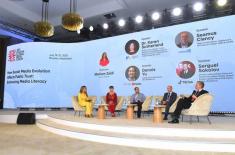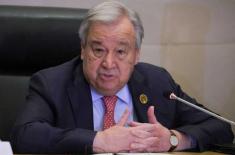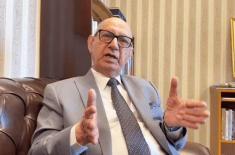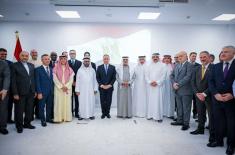
Pakistan Steps Up Climate Action With Carbon Market Training Workshop In Karachi
Muhammad Irfan Published July 21, 2025 | 08:06 PM

The public and private sector stakeholders gathered in Karachi this week for a specialized training workshop on carbon markets, hosted under the Supporting Preparedness for Article 6 Cooperation (SPAR6C) program
ISLAMABAD, (UrduPoint / Pakistan Point News - 21st Jul, 2025) The public and private sector stakeholders gathered in Karachi this week for a specialized training workshop on carbon markets, hosted under the Supporting Preparedness for Article 6 Cooperation (SPAR6C) program.
The workshop, was held in collaboration with the Ministry of Climate Change & Environmental Coordination (MoCC&EC) and the Planning and Development Department Sindh, aimed to build national capacity for engaging in international carbon markets — a crucial tool for funding low-carbon development and achieving Pakistan’s climate commitments.
“Pakistan is at a critical juncture in its climate action journey, and carbon markets will play a pivotal role in achieving our net-zero ambitions,” said Zubair Ahmed Channa, Secretary of the Environment, Climate Change & Coastal Development Department, during his opening address.
“This workshop serves as an important step in fostering collaboration between public and private stakeholders to mobilize climate finance for sustainable development.”
Carbon markets allow countries and companies to trade emission reduction credits, providing financial incentives for reducing greenhouse gases. Under Article 6 of the Paris Agreement, countries like Pakistan can generate and trade Internationally Transferred Mitigation Outcomes (ITMOs) to meet their climate goals while attracting investment.
International experts led technical sessions at the workshop, including Denis Machnik, Senior Advisor on Carbon Markets at UNEP Copenhagen Climate Centre (UNEP-CCC), who explained how Pakistan can benefit from Article 6 cooperation. “Carbon markets offer a real opportunity for countries like Pakistan to attract climate finance while reducing emissions in sectors such as energy, transport, and waste,” Machnik noted.
Other speakers included Jonas Hagen of GFA International, who outlined carbon market potential in key industries, and Ahsan Kamran, a SPAR6C carbon markets expert, who provided a step-by-step breakdown of project cycles — from establishing baselines to validating and transferring emission reductions.
Urwah Khan, Advisor on Climate & Energy at UNEP-CCC, highlighted the growing readiness of Pakistan for carbon market transactions and emphasized opportunities for private sector engagement. “We are entering a phase where carbon finance can become a driver for clean investment across sectors,” she said.
Provincial perspectives were also represented. Nadia Shafiq from Planning & Development Punjab and Babar Sahib Din, CEO of Lahore Waste Management Company, shared insights on how the waste sector could leverage carbon finance to scale green projects. They underscored the importance of aligning public policy with market incentives to promote low-carbon innovation.
The event concluded with a high-level panel featuring representatives from leading investment banks and financial institutions. The discussion focused on integrating carbon finance into mainstream investment strategies, and the role of commercial banks and the State Bank of Pakistan in supporting the transition to a green economy.
The SPAR6C program, backed by international partners and technical experts, continues to support Pakistan in preparing for climate-related market mechanisms. By building capacity and strengthening partnerships, the initiative aims to catalyze investment in climate mitigation projects, paving the way for a sustainable, low-carbon future.
Recent Stories

SGCA 2025 announces global partnerships with CSO Network, Asia House, AAP to amp ..

UAE Pro League announces nominees for 2024-2025 season awards

56th Session of Arab Permanent Committee on Human Rights discusses Israeli viola ..

Widespread rainfall expected across Pakistan; PMD issues flood and landslide ale ..

Third Shusha Global Media Forum concludes, highlights media literacy, AI challen ..

UN Secretary-General appalled by accelerating breakdown of humanitarian conditio ..

PML-N's Hafiz Abdul Karim wins Senate seat from Punjab with 243 votes

Senate revises rules to strengthen presiding mechanism, update regional terminol ..

Killing of couple condemned

Gold prices in Pakistan soar to Rs361,200 per tola

Sindh takes notice as chicken prices go up in Karachi

Nahyan bin Mubarak attends celebration of 23rd July Revolution at Egyptian Embas ..
More Stories From Pakistan
-
NA Speaker expresses sorrow over Bangladesh Air Force plane crash
3 hours ago -
DPM, President UNGA discuss situation in Middle East
3 hours ago -
Sherry Rehman Condemns Balochistan Honour Killing as "Barbaric and Shameful"
4 hours ago -
Key objective of establishing university is to produce modern knowledge-based research: Governor
4 hours ago -
MD Afridi College Peshawar Pays Special visit to NLPD
4 hours ago -
Senate condemns Balochistan honour killing as lawmakers call for justice
4 hours ago
-
Cloudburst triggers flood emergency on Babusar road; tourists evacuated
4 hours ago -

PML-N's Hafiz Abdul Karim wins Senate seat from Punjab with 243 votes
4 hours ago -

Senate revises rules to strengthen presiding mechanism, update regional terminology
4 hours ago -

Killing of couple condemned
4 hours ago -

Nation to celebrate Independence Day-2025 with unique style, enthusiasm: Ahsan Iqbal
4 hours ago -

NP Punjab President Ayub Malik condemns honour killings in Balochistan, urges strong Govt action
4 hours ago




